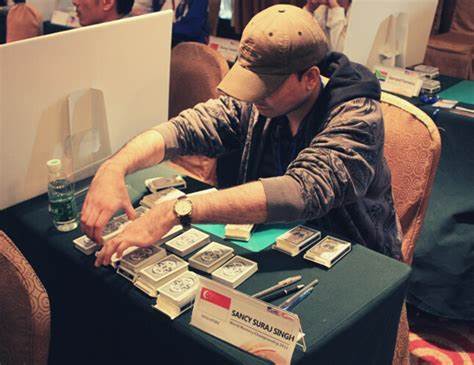From Amateur to Ace: The Story of Sancy Suraj’s Memory Triumphs
Sancy Suraj is a memory athlete from Singapore who has gained recognition for his impressive memory skills. He currently holds six memory records, including the Singapore record for reciting the most pi digits and identifying all elements of the periodic table in record time. In this article, we will explore Sancy’s memory training journey, his personal and professional achievements, and his future goals in the field of memory training.

How did you first get interested in memory training?
I have always been fascinated by memory and the potential it holds. Growing up, I struggled with remembering things and this led me to explore various techniques to improve my memory. I started with simple memory exercises and gradually progressed to more complex techniques. This curiosity eventually led me to discover the world of memory training, and I started to attend memory workshops and competitions to improve my skills. Over time, my interest in memory training grew, and I realized that I could use my abilities to break records and achieve new heights in the field.
My journey from being an amateur to becoming a record-breaking memory athlete has been a challenging but rewarding one. Initially, I struggled to remember basic information and often felt overwhelmed by the amount of information I needed to retain. However, with practice and perseverance, I gradually improved my skills and began participating in memory competitions. These competitions gave me the opportunity to test my abilities against some of the best memory athletes in the world, and to learn from their techniques.
As I continued to compete, I started to break records and achieve new milestones in memory training. This not only gave me a sense of personal satisfaction but also helped me to inspire others to explore their own potential. Today, I am proud to say that I hold six memory records, including the Singapore record for reciting the most pi digits and the record for identifying all elements of the periodic table in the shortest time.
Overall, my journey from being an amateur to becoming a record-breaking memory athlete has been one of self-discovery and growth. It has taught me that with hard work, dedication, and the right techniques, anyone can improve their memory and achieve their goals. I hope that my story can serve as an inspiration to others who are looking to explore their own potential and discover the amazing abilities of their brain.
Can you walk us through your journey from being an amateur to becoming a record-breaking memory athlete?
My journey to becoming a record-breaking memory athlete began with a simple desire to improve my memory. As I mentioned earlier, I struggled with remembering things and often felt overwhelmed by the amount of information I needed to retain. This led me to explore various techniques to improve my memory, such as the memory palace technique and mnemonics. These techniques not only helped me to remember information better but also sparked my interest in memory training.
As I became more proficient in these techniques, I started to participate in memory competitions. These competitions allowed me to put my skills to the test and learn from other memory athletes. I also began to develop my own techniques and strategies, which helped me to achieve new milestones in memory training.
However, becoming a record-breaking memory athlete was not without its challenges. I had to devote a significant amount of time and effort to practicing and perfecting my techniques. I also had to learn how to manage my stress and maintain focus during competitions, which was not always easy. But through persistence and determination, I was able to overcome these obstacles and achieve my goals.
Today, I am proud to be recognized as one of the top memory athletes in the world. I have broken several memory records and have been featured in various media outlets for my achievements. However, my journey is far from over, and I continue to work on improving my memory skills and pushing the boundaries of what is possible in the field of memory training.
What do you think sets you apart from other memory athletes?
What sets me apart from other memory athletes is my unique approach to memory training. I believe that memory training is not just about memorizing information but also about developing the ability to learn and retain information quickly and effectively. To achieve this, I focus on developing a strong foundation of memory techniques, including the memory palace technique, mnemonics, and visualization.
In addition, I also place a strong emphasis on physical and mental fitness, which I believe are crucial to developing a strong memory. I regularly engage in physical exercise, such as running and weight training, to improve my overall health and well-being. I also practice mindfulness meditation and other mental exercises to improve my focus and concentration.
Another factor that sets me apart from other memory athletes is my ability to adapt to different types of information. While many memory athletes specialize in memorizing a specific type of information, such as numbers or words, I have developed the ability to memorize a wide range of information, including elements of the periodic table, historical dates, and pi digits. This has allowed me to excel in a variety of memory competitions and break records in different categories.
Overall, I believe that my unique approach to memory training, combined with my commitment to physical and mental fitness, has set me apart from other memory athletes and helped me achieve my goals in the field.
“I don’t just memorize information, I master the art of learning and retaining it efficiently. Through a combination of memory techniques, physical fitness, and mental discipline, I strive to push the limits of what is possible in the world of memory athletics.”
How has memory training impacted your personal and professional life?
Memory training has had a significant impact on both my personal and professional life. Personally, it has helped me to overcome my struggles with memory and has allowed me to learn and retain information more effectively. This has improved my confidence and overall quality of life. It has also allowed me to participate in memory competitions, which has been a source of personal satisfaction and achievement.
Professionally, memory training has opened up new opportunities for me. As a memory coach, I am able to help others improve their memory skills and achieve their goals. I have also been able to use my memory skills in my work as a data analyst, allowing me to quickly analyze and retain large amounts of data.
In addition, memory training has also helped me to develop skills such as focus, concentration, and creativity, which are valuable in many areas of life. These skills have helped me to be more productive and efficient in my work and personal life.
Overall, memory training has had a positive impact on both my personal and professional life, and I am grateful for the opportunities it has provided me.
What are some of the biggest lessons you’ve learned from your memory training journey?
One of the biggest lessons I’ve learned from my memory training journey is the power of persistence and hard work. Achieving success in memory training requires a lot of practice, dedication, and patience. I’ve had to put in countless hours of practice to improve my memory skills and break records.
Another important lesson I’ve learned is the importance of staying focused and managing stress. Memory competitions can be incredibly stressful, and it’s important to be able to stay calm and focused under pressure. Through mindfulness meditation and other mental exercises, I’ve learned how to manage stress and maintain focus during competitions.
Memory training has also taught me the value of creativity and innovation. To succeed in memory competitions, it’s not enough to simply memorize information. You have to be able to come up with unique and effective memory techniques to quickly and effectively retain information. This has taught me to think outside the box and approach problems with creativity and innovation.
Lastly, memory training has shown me the power of setting goals and working towards them. By setting specific goals and developing a plan to achieve them, I’ve been able to make steady progress and achieve new milestones in memory training. This has been a valuable lesson that I’ve been able to apply to other areas of my life as well.
Overall, my memory training journey has taught me many valuable lessons, including the importance of persistence, focus, creativity, and goal-setting. These lessons have not only helped me to succeed in memory training but also in other areas of my life.
“Through my memory training journey, I’ve learned that success is not just about memorization, but also about persistence, creativity, and the ability to manage stress and stay focused under pressure. These skills are not only important for memory competitions but also for achieving success in all areas of life.”
Sancy first became interested in memory training when he was struggling with memory problems. He began researching memory techniques and practicing them regularly, eventually becoming an accomplished memory athlete. Sancy’s journey from being an amateur to becoming a record-breaking memory athlete required a lot of hard work, persistence, and dedication. He had to put in countless hours of practice to improve his memory skills and break records.
What sets Sancy apart from other memory athletes is his creativity and innovation in developing memory techniques. He understands that memorizing information is not enough, and to succeed in memory competitions, he has to come up with unique and effective memory techniques. This has taught him to approach problems with creativity and innovation.
Sancy’s memory training has had a significant impact on his personal and professional life. It has helped him to overcome his struggles with memory and learn and retain information more effectively. Professionally, he has been able to use his memory skills in his work as a data analyst and as a memory coach, helping others to improve their memory skills.
Through his memory training journey, Sancy has learned valuable lessons, including the importance of persistence, focus, creativity, and goal-setting. He plans to continue improving his memory skills, breaking records, and helping others to improve their memory skills as well. He is also interested in exploring the potential applications of memory training in fields such as education and medicine.

What are your future goals in the field of memory training?
My future goals in the field of memory training include continuing to improve my own memory skills and helping others to do the same. I plan to continue competing in memory competitions and breaking records, while also expanding my knowledge of memory techniques and exploring new areas of memory training.
As a memory coach, I want to continue helping others to improve their memory skills and achieve their goals. I believe that memory training can benefit people from all walks of life, and I want to share my knowledge and expertise with as many people as possible.
In addition, I’m also interested in exploring the potential applications of memory training in fields such as education and medicine. I believe that memory training has the potential to improve learning outcomes for students and to help individuals with cognitive impairments to improve their memory function.
Overall, my future goals in memory training involve continuing to push the boundaries of what is possible in memory competitions, while also exploring new areas of research and practical applications for memory training. I’m excited to see where this journey will take me, and I’m committed to continuing to work hard and push myself to new heights.
“Memory training is not just about memorizing information, it’s about unlocking the limitless potential of our minds and empowering ourselves to achieve our goals and dreams.”
Sancy Suraj’s story is an inspiring example of how hard work, persistence, and dedication can lead to remarkable achievements. Through his memory training journey, he has developed valuable skills that have had a positive impact on his personal and professional life. We look forward to seeing Sancy continue to push the boundaries of what is possible in memory competitions and explore new areas of research and practical applications for memory training.





